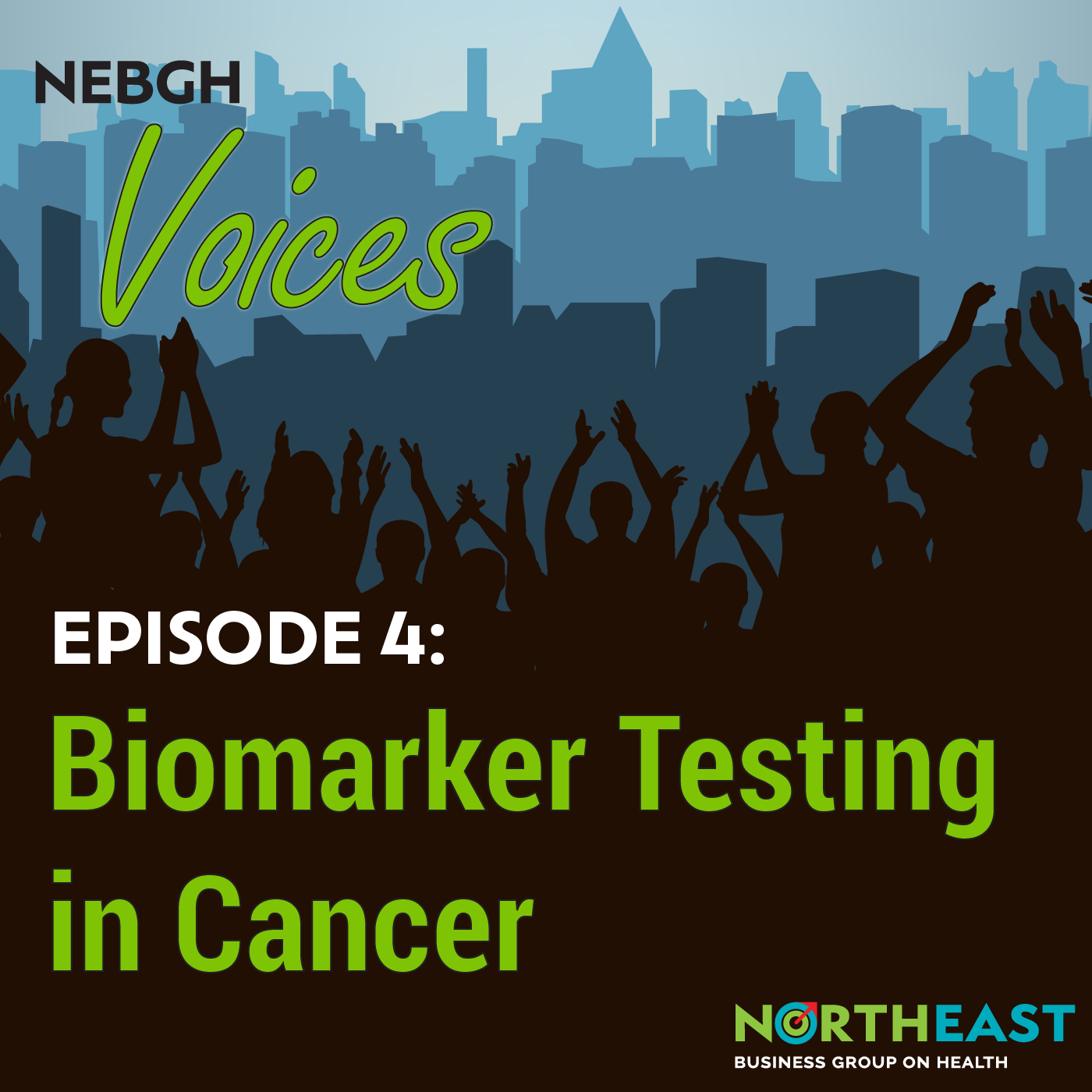Kim
Kim, hello everyone. I’m Kim Thiboldeaux, and it is my pleasure to welcome you to NEBGH voices. Settle in, open your mind, and get ready to explore fresh perspectives with today’s guests. Lena Chaihorsky is the Senior Vice President of Payer Innovation at ALVA10 Inc., and Ryan Hutto is the Head of Commercial Diagnostics at Pfizer oncology. The views and comments that Ryan shares today on the episode are his own and do not necessarily reflect the views of Pfizer and our guests are not being compensated for today’s participation in this podcast. Lena and Ryan, welcome to the podcast.
Ryan
Thank you, Kim.
Lena
Thanks, Kim. Great to be here.
Kim
So Lena, let me start with you. Tell us a little bit about you and about your background.
Lena
Sure. So I’m a generation zero immigrant. I’m a mathematician, academically, but I’ve actually spent my entire career in healthcare, and healthcare really frazzles mathematicians, because we like to solve clear equations, and healthcare is anything but that. Um, but I spent my career specifically in the field of diagnostics, and I started working at a small startup company. I’m a two time entrepreneur. Worked at that company, built a very successful strategy that launched a very meaningful diagnostic test into Women’s health. And then led global reimbursement and health economics at a company called QIAGEN, which is a global IBD diagnostics company. And then left to co start to co found my own company, ALVA10. So my world is really the world of diagnostic technology, personalized medicine, and making sure that those technologies and tests are appropriately covered by insurance companies, so that patients have easy, seamless access to them when they get these tests ordered by their doctor.
Kim
Amazing, great. Thanks for sharing that, Lena. Ryan, tell us about you.
Ryan
Thanks. Kim. Well, I grew up from humble beginnings. My father owned an automotive repair shop in San Diego, where I attribute much of my work ethic and grit from. He fueled his love from cars from my mom’s career working as a scientist in the carbon 14 lab at UCSD. My uncle was a primary care physician, and much of my family is in the healthcare field. One might say that healthcare and patient care is in my DNA, and I’ve worked on the commercial side in the medical device industry, both pharma and biotech and then lab. I found that the most rewarding experience, though, that I’ve had to date is where I continue to put my focus on it, and that’s on the diagnostic side of things. Because in lab, there’s never a straightforward yellow brick road leading to all answers. Instead, I found it’s a series of steps and paths that lead to a patient diagnosis. Currently, I lead the commercial diagnostics department of Pfizer Oncology, and have the unique honor and privilege of working with the diagnostics team, whose sole focus is ensuring that appropriate and responsible biomarker testing is taking place across the markets. I’m also grateful to work for an organization that puts patients as its north star and its mission is to outdo cancer. Prior to Pfizer, I led the commercial diagnostics department at Seagen, monoclonal antibody company focused on novel healthcare outcomes.
Kim
Great, amazing, both of you. It’s terrific backgrounds for the conversation today, which is about biomarker testing. Lena, let’s start with the basics. What is biomarker testing? You know, in broad terms, right? And I’ve, you know, I’ve heard other names for biomarker testing, which obviously is confusing for patients. I’ve heard, for example, the term “next generation sequencing.” So talk to us a little bit about sort of the broad category of biomarker testing?
Lena
Yeah, sure. So let’s start at the beginning. Biomarker testing in general is the practice of analyzing things like blood, tissue, urine, to find genes, proteins, other molecules that give us a really personalized view of what a specific disease is doing in your body. So this is as simple as, let’s test this person’s urine and see if they’re pregnant, because we know what protein we’re looking for there, and that can get all the way as complex as, let’s test this person’s cancer tissue to figure out what’s driving their cancer, because if gene A is driving their cancer, we want to give them drug A. If gene B is driving their cancer, we want to give them drug B. And we definitely don’t want to be giving drug B to someone whose cancer is actually driven by gene A, because that is not going to work. So that’s kind of what biomarker testing is. What the term you use, “next generation sequencing” is a way of doing biomarker testing. And you can think about this in like a thought bubble of next generation sequencing is done on this massive lab machine, like this enormous microwave looking thing that sits on a lab bench, and there’s a lot of different types of lab machines. There are lab machines that look at DNA, that look at proteins, that look at RNA, which makes proteins. And next generation sequencing is the process of, well, first we have to break up in the cell, and we fish out the DNA, and then we read the DNA like a book. And when I say that, I mean think book, paragraph, sentence, letters, right? And next generation sequencing is a process of reading all those letters and then actually issuing a report of what do all these letters mean. So you can think of it as like biomarker testing is what personalized medicine, precision medicine is really all about and next generation sequencing is a way of doing biomarker testing.
Kim
And Lena, what about the term genomic testing? Because I’ve heard that used interchangeably as well.
Lena
That’s a great question. So you may have heard genomic testing, you may have heard genetic testing. There are a couple different ways of thinking about this, but I would say the simplest way of thinking about it is genetic testing, genetics are what you get from your family, like braca, right, in breast cancer risk. Genomic testing is everything else. It’s testing all of the genes at large. It’s the stuff that happened spontaneously as your parents DNA was coming together, and maybe you have some sort of a different mutation than what your parents gave you. So genetics. Think genetics is what came directly from my family. Genomics is everything else. That’s probably and Ryan, maybe this could be a side conversation between the two of us, but that’s how I think about it. To just kind of categorize it most simply.
Kim
Yeah, that’s great. I wanted to start at the broadest level. Now, you know, we want to drill down Ryan a little bit to the cancer conversation. So let’s talk about biomarker testing specifically for cancer. Why is it important for cancer? How does it work? Also, I know Ryan for so many different tests that folks can have and types of tests and turnaround times for results. But let’s dive in on the cancer piece. Ryan.
Ryan
Yeah, so Lena, you did a great job explaining that part of it. I would say for cancer, you have many healthy cells in your body, and you have cells that are riddled with cancer, right? And from that note, we’re looking for heat seeking missiles that target those unhealthy cells very specifically. And so to that note, therapies have been developed that target these specific genomic alterations or express proteins. Biomarker testing identifies patients that will most likely benefit from those therapies. When you think about biomarker testing. It’s more of an umbrella term, and the specific test is dictated by the cancer being tested for the role of the pathologist initially is to determine the type of cancer the patient has based on the pathological evaluation. Once the cancer is identified, appropriate biomarker testing identifies potentially actionable biomarkers. And like you said there are many different modalities of testing from icy fish below NGS, you name it, the type, the turnaround time plays a role in this, because as you’re sending out to get back results, you want to make sure that you have all the options on the table when you go ahead and when the patients are going on a first line therapy or, or starting to lay out what their roadmap is going to be to tackle the type of cancer that they have. So it’s really important that physicians order the right test and they get the the results back in a very timely manner and a different, it is differentiated by the type of test that’s used.
Kim
Great, terrific. Very helpful, Ryan. So Lena, how does a patient diagnosed with cancer know if they need biomarker testing, should they assume their doctor will order the correct testing? Do they need to ask for it? Does every cancer, every cancer patient, qualify for biomarker testing, or only certain cancers? I know that’s a lot, but if we’re thinking about, you know, from a patient or employee perspective in our network, okay, “Biomarker testing, what do I, What do I do as the consumer,” right?
Lena
Yeah, no, absolutely. I love this question, actually, because I think this is one of the biggest rainbow bridges we need to cross in healthcare. Is like, Okay, we’ve got all this amazing technology and all these labs, but the patient standing in front of their doctor, what does this mean for them? So you could actually argue, in 2025 now, every single one of us needs biomarker testing for one reason or another, because biomarker testing does not just answer questions about cancer. Biomarker testing can tell us is HUMIRA going to work for a rheumatoid arthritis patient or a psoriasis patient? Do I have early stage colorectal cancer? Do I really need a colonoscopy? Maybe I’m at much higher risk. Maybe there’s actually something you know they need to cut out via colonoscopy. Biomarker testing can tell us, you know, you can do voice biomarkers for depression, you can do eye tracking for PTSD. It is a brave new world of biomarker testing. So you could. So I just kind of want to start with that, because I really want to make sure that people feel that all of the health care that they get, they have a right to it being personalized and not being given to you on a law of averages, and biomarker testing is the only real way to create personalized health care. So to your question on cancer, we unfortunately cannot assume that a physician is going to order biomarker testing, and we have some really unfortunate statistics around this. In lung cancer, which I can’t even explain fully, the advances we have made in lung cancer in the last 20 years. It is unbelievable what we have been able to do in this space. All of the guidelines say these are the biomarker tests you need for cancer. For lung cancer. No question about it. Do you know what percentage of Americans get that biomarker lung cancer testing like percentage of Americans that have lung cancer that get the biomarker test that all the guidelines have been screaming that they need for years?
Kim
Tell us. Tell us.
Lena
36%
Kim
Yikes. Yikes.
Lena
So it’s actually the opposite. As efficient you need to walk into the, as a cancer patient, you need to walk into that office armed with the knowledge, then the statistics are telling you there’s a better chance your physician is not going to order that biomarker cancer testing. And on one hand, I kind of wish that was better news, but on the other hand, I feel like that’s the kind of statistic like to me. I feel like that really empowers me, right? Because I can walk into an office where I would, I would tell any patient, you need to walk into an office and after the cancer has been cut out, if that’s what they’re doing, the very first question out of your mouth needs to be whatever therapy you guys are talking about. How do you know it’s the right therapy for me? How do you know it’s going to work on me? Chemo, radiation, precision therapies. It doesn’t matter. We’ve got biomarker testing that can tell us do people need to be on chemo for a certain amount of time, or a much longer amount of time. We’ve got biomarker testing that’ll tell us radiation or no radiation, this drug or that drug. So I think that’s the question that really opens the conversation with the physician, right? You want to put me on a care pathway? I’m all for it. How do we know that one’s going to work on me? Right? And I think that is how to frame a conversation that I hope everyone can kind of take with them and keep in their back pocket. Because unfortunately, this is an area, and from a physician perspective, I mean, it’s just unbelievable the speed of technology today. Physicians in this country are undervalued, underpaid. They are so busy, half the time they’re busy doing insurance activities, not even doing patient activities, so no one could be reading the latest study on whatever, right? And I think this is unfortunately, it shouldn’t be our job. It definitely shouldn’t be the employer’s job, but it kind of becomes our job to make sure we get the care we deserve, and that’s by asking a very respectful but very appropriate question to the audience.
Kim
Just nice, great, great advice. Great advice. Let’s jump in on that, on that payment question. Ryan, are we seeing any issues with insurance companies covering biomarker testing? How should employers ensure that this testing is covered in part of the benefits that they’re offering?
Ryan
Yeah, that’s a loaded question, I would say, before I jump into that, first of all, Lena, you hit the nail on the head when you talked about the 36% receiving a targeted therapy with non-small cell lung cancer. I believe the study you’re referring to, there was 1000 patients with non-small cell lung cancer that had potentially actual biomarker targets, and only 30%, 36% received a target of therapy. So realizing the potential of precision medicines means ensuring that no patients is lost, during the, due to gaps in care. It means getting the right test at the right time to identify the right treatment for each patient based on the guidelines and recommendations of the oncologist in partnership with the pathologist, of course. I think the first thing is patients really need to take an active role in their own health care, and a component of that means understanding their biomarker status. But testing is recommended by an oncologist, the patient you know, they can check with their insurance plan to ensure that they’re testing within network, and they can inquire about out of the pocket expenses, and in some cases, labs will have their own patient assistance programs and departments to help the patient navigate whether a test is covered or not and how to get it paid for. One thing I talked about a minute ago was the different modalities of testing, right? It’s really, really important that the results come back, so that a patient’s output on therapy A and then ahead of the results getting to the oncologist, and then it disqualifies an actual targeted therapy from being used when the results come in. So it’s really really important that those that they get the right tests at the right time and get their biomarker status.
Kim
And any thoughts about on the insurance side or on the employer side? Ryan, I think it’s something that our employers want to, sort of, you know, dig into and make sure that they’re designing plans that are going to cover this type of testing.
Ryan
Yeah, I think, I think science and science and medicine continues to evolve every day. I mean, next gen sequencing is, is a big buzzword out there. You can look at 50 to 500 genes. I think what insurance is, what’s important for insurance companies is really ensuring that the patient outcomes are optimal, right? Like they’re they’re putting the the funds behind the tests. They’re going to make the biggest impact, the biggest difference, for patient care. And so, you know, I, It’s really up to the oncologist to decide which test is going to be right for that patient, because every, every patient’s cancer journey is different, right? And it’s really up to the provider to help navigate that.
Kim
And I, and I think that so two things, though, number one, Ryan, it seems that,Number one, you want to make sure you’re getting this testing for optimal outcomes right for patients employees. And for number two, I’ve certainly seen instances where it creates a cost savings, because if a patient’s being treated, they have not had biomarker testing, and they’re being treated with the drug that we know is not going to work for them if we had done the testing, it seems to me that in the long term, there can be cost savings by ensuring patients are getting biomarker testing. Ryan, yes?
Ryan
Yeah. And that depends on where, where these tests are being done in the patient journey, right? If you’re saving next gen sequencing to when the patients progress to, let’s say, a third or fourth line of therapy, and not being done up front, that can also hinder that what’s available to them. So it’s really important that, that, that the patients are asking the right questions around their biomarker status, asking the oncologist, is this right for me?
Kim
Yeah.
Ryan
And if they’re, if they’re, oncologists are recommending something, having that conversation with their insurance company and the lab to make sure that they’re on the right track.
Kim
Yeah, terrific. Really helpful. Lena, I want to go back to this term. I think you’ve both said it this term actionable, right? So maybe we use lung continue to use lung cancer, you know, as an example. So let’s say you’re diagnosed with lung cancer, you should be getting certain biomarker testing, you know, you test positive. You know, again, you know, through the genomic testing, you test positive, which means that you, you know, we now know what kind of treatment you should get based on that testing. Can you kind of walk us through a scenario?
Lea
Yeah, definitely. You know, before that, I want to just go back to something that Ryan just said, and kind of touch a little bit more on the insurance side of things, because I think there’s, there’s more here, and it’s, it’s absolutely a loaded topic, right? But I think without really having this conversation, it’s hard to move the conversation forward, at large and ultimately, and I talk with insurance companies every day. I have been working in this space for years, and I have seen insurance companies struggling, sometimes appropriately, sometimes I would argue overly conservatively around what to cover in diagnostic testing. And it’s interesting, right? I think insurance companies will sometimes hold diagnostic testing to a standard that is far above the standard to which they hold drugs. We don’t expect our drugs to be 100% perfect, but insurance companies are far more likely to not cover a diagnostic test that they deem to be not 100% perfect and and maybe that’s oversimplifying a little bit, but it is. It is kind of a huge way of looking at this problem. And the problem has actually gotten so big that the American Cancer Society started a massive legislative push a couple years ago to start working with state insurance boards to start having them mandate that insurance companies cover this testing. So on one hand, you know, we may be reading coverage policies that say that insurance companies are covering testing, but we didn’t get to that 36% in a vacuum, right? Access to care is a huge, huge issue in this space, and it is such a huge issue that now we’re trying to solve it with the legislative hammer, which doesn’t always work. Sometimes, you know, you need you need a much finer tool. You need a scalpel. But in this unfortunately, in this case, we’re having to start with the hammer. So I just wanted to point that out, because that’s a massive shift in the discussion in biomarker testing and cancer that’s happening right now, and that, I think is is entirely appropriate, because we have, we have had a lot of biomarker testing suffocated from prior authorization, from inappropriate interpretation of clinical studies, from overly conservative interpretation on the diagnostic end as compared to the as compared to the therapeutic end. All of these things come into place. And I just wanted to put that out there,
Kim
Yeah, and it is a, it is a patchwork Lena, right? Because, again, we’ve got the, we’ve got the legislative issues. We’ve got the issues with different hospitals and hospital systems and providers. We’ve got, you know, I think employers are very empowered in this space to ensure coverage, and then you know, of course, the consumer, the patient, the employee. I think you know, part of our takeaway here is that you as a patient and employee should also be empowered to be asking the right questions about biomarker testing and working with both your provider and, you know, the employer, and potentially the plan to make sure that you’re getting the appropriate testing based on guidelines, and you know, your providers advice, right?
Lena
Yeah, absolutely. And I’ll answer your actionable question, and I promise. But kind of another point in the in the world of biomarker testing, from an economics perspective, is and Ryan touched on this a little bit, but I just want to kind of underline this point, that if you do biomarker testing, it may turn out that a patient is an excellent candidate for a clinical trial that’s happening, which they should be on, versus a drug that is not going to work for them. And then picks up the cost of that clinical trial, and they’re happy to do that, because that is part of what their overall, I would say remit is and the health system, and that is massive savings for the employer. Yeah, I don’t think that gets talked about enough that clinically are not like the last, last result, one of the trials are actually a first line. We have such a phenomenal system set up in the US, and less than 5% of patients actually get access to it, and biomarker testing is going to help that.
Kim
And I think also Lena, so many trials now are being designed based on the results of your biomarker testing versus just your, you know, not just based on your cancer diagnosis, based on the results of the biomarker testing. And I think, I think reinforcing the importance of trials is a great thing,
Lena
Yeah, and, and one and one last point on that, and then I promise I’m going to answer your question the and it’s also sort of understandable, right? Because if you you know, if you don’t, if you’re on a drug and then you want to get on a clinical trial, you’re no longer treatment naive, right? So the pharma company isn’t actually able to understand if their drug worked on you, which is not going to work for the FDA. So all of these pieces work together.
Kim
Meaning so, just so we can explain to our listeners, so, meaning that in some instances, you may not qualify for a certain trial because you’ve already been treated on a certain drug, and maybe it was a drug that we knew it was the wrong drug, but now you don’t qualify when we say treated naive, that’s what we mean. It was the wrong drug. So again, I think the importance of exploring, let’s do a whole nother show on clinical trials, because it’s such a huge topic. All right, actionable results, Lena. Actionable results, understand what that means.
Lena
Yes, great and fantastic question. Actionable results basically means the information that I just got from all my biomarker testing is that information that’s going to make my doctor put me on a different drug, put me on a different dose of the drug, keep me on a drug for a longer, shorter amount of time, versus information that the doctor looks at and says, that’s nice, but it doesn’t change what I’m actually doing for you. And so in biomarker testing, because we’re running a patient sample, we may sometimes run this a ton of information. You can’t see my hands right now, but it is I am blowing up my hands. It’s a ton of information, and then a portion of that is going to be actionable results. But we run the ton of information because the knot in the body of science is changing, and something that we may think is not actionable today, in a couple years, actually becomes actionable. And so that’s sort of why, you know, you might think, Oh, well, why not just run the stuff that’s only actionable? Well, because the definition of what’s actionable is changing. So it’s just like, you know, let’s say I don’t know. You are gonna sample soil, right? You’re not just gonna sample for one thing, right? You’re going to say, hey, run the whole thing, right? I don’t know. Maybe I’m going to need some of this later. It’s a very similar way of thinking about why we get so much information, even if we only use a portion of it today.
Kim
So let’s start. So, Ryan, we’re getting to the end of our conversation here, but let’s just drill down on that a little bit more before we wrap. So does that mean, is biomarker testing, you know, should we be doing more comprehensive panels? Is it one and done? Should patients be tested repeatedly over the course of their treatment, and I guess also, if the cancer eventually returns, do we start from from square one, with biomarker testing?
Ryan
Yeah, that’s a great question. So as with anything, it really depends on several factors. One, is your cancer driven by a mutation that you’ve had since birth, right, and that would be considered more or less a germline type of test, or is it acquired, meaning somatic? There’s also acquired resistant mutations that occur, you know, following treatment. So guidelines for specific cancers recommend retesting at progression so. But all of this again, goes back to the conversation with the oncologist. What I will also say, you know, backing up a little bit to Lena’s earlier points, you know, insurances, I think, are apprehensive right around testing in general, paying for tests that are either one unnecessary or two are redundant, like the historically, I think labs have promoted tasks or whatnot to oncologists and to other providers, and not really understanding what does that mean for the patient, right? And so we’ve gotten further along in the healthcare spectrum now to really understand what these tests mean and how to interpret these tests. So I think that, that is, that is all changing and time. And then, to touch really back on your clinical trial part, many labs, when they run a next gen sequencing type of report, I would encourage patients look through your report. In the back of the report, typically, they will have, in some cases, recommended trials that you might be eligible for. Right? It might be local, it might be regional, might be national, in Scope, these are really good questions to ask your oncologist if you are a fit for upfront. So.
Kim
Terrific, great, great tips, guys. And I think really, for me, the takeaway is that that both our employers and their employees can be empowered in ensuring that that patients are getting the right testing at the right time, so that they can get the right treatment at the right time. So I really appreciate all of the tips and advice that you guys have shared today. Really want to thank you for, for joining us, for sharing your incredible expertise on the topic. I know it will be an inspiration and very educational for for our listeners, and as the episode comes to a close, I want to recognize our premier sponsors, Pfizer and Sanofi, our presenting sponsors, Grail and Memorial Sloan Kettering Cancer Center and our supporting sponsor, Johnson and Johnson. I’ll mention Grail is an independent sponsor of the podcast, not affiliated with the other sponsors. These wonderful partners make it possible for us to share this incredible content with our listeners. This is NEBGH voices. We hope you’ve learned something new today, and until next time, I wish you wellness…
Kim
and I am one of the voices,
Kim
of the voices of NEBGH.








